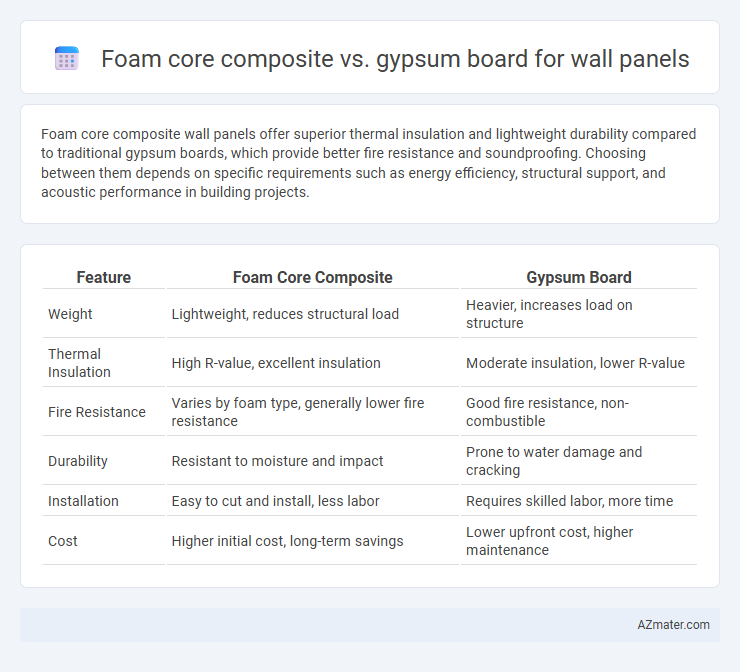Foam core composite wall panels offer superior thermal insulation and lightweight durability compared to traditional gypsum boards, which provide better fire resistance and soundproofing. Choosing between them depends on specific requirements such as energy efficiency, structural support, and acoustic performance in building projects.
Table of Comparison
| Feature | Foam Core Composite | Gypsum Board |
|---|---|---|
| Weight | Lightweight, reduces structural load | Heavier, increases load on structure |
| Thermal Insulation | High R-value, excellent insulation | Moderate insulation, lower R-value |
| Fire Resistance | Varies by foam type, generally lower fire resistance | Good fire resistance, non-combustible |
| Durability | Resistant to moisture and impact | Prone to water damage and cracking |
| Installation | Easy to cut and install, less labor | Requires skilled labor, more time |
| Cost | Higher initial cost, long-term savings | Lower upfront cost, higher maintenance |
Introduction to Wall Panel Materials
Foam core composite panels offer superior thermal insulation and lightweight durability compared to traditional gypsum board, making them ideal for energy-efficient wall systems. Gypsum boards provide excellent fire resistance, soundproofing, and ease of installation, commonly used in residential and commercial interior walls. Choosing between foam core composites and gypsum boards depends on specific project requirements such as insulation performance, structural strength, and fire safety standards.
What is Foam Core Composite?
Foam core composite is a lightweight, high-strength material consisting of a rigid foam core sandwiched between two layers of composite sheets, often made of fiberglass or resin-infused fabrics. This structure provides excellent thermal insulation, moisture resistance, and dimensional stability, making it ideal for wall panels in both residential and commercial buildings. Compared to gypsum board, foam core composite offers superior durability, impact resistance, and enhanced energy efficiency for wall panel applications.
What is Gypsum Board?
Gypsum board, also known as drywall or plasterboard, is a widely used building material composed of a core of gypsum plaster pressed between two thick sheets of paper. It offers excellent fire resistance, sound insulation, and ease of installation, making it a popular choice for interior wall panels. Unlike foam core composites, gypsum board provides a more rigid and durable surface suitable for a variety of finishes and structural applications.
Structural Performance Comparison
Foam core composites offer superior structural performance compared to gypsum board due to their higher strength-to-weight ratio and enhanced impact resistance, making them ideal for applications requiring durability and load-bearing capacity. The foam core provides excellent rigidity and energy absorption, while gypsum board tends to be more brittle and prone to cracking under stress. In seismic and high-wind environments, foam core composite panels maintain structural integrity better than gypsum boards, reducing maintenance and replacement costs.
Thermal Insulation Properties
Foam core composite panels offer superior thermal insulation compared to gypsum boards due to their closed-cell structure, which significantly reduces heat transfer. The R-value of foam core composites ranges between 4 to 7 per inch, whereas gypsum boards typically have an R-value around 0.5 per inch, making foam cores more energy-efficient for wall applications. Enhanced thermal resistance in foam core composites contributes to better temperature regulation and reduced energy costs in buildings.
Fire Resistance and Safety
Foam core composite wall panels offer enhanced fire resistance due to their fire-retardant core materials, often meeting ASTM E84 Class A standards, which limits flame spread and smoke development. In contrast, traditional gypsum board provides inherent non-combustibility and fire protection through its calcium sulfate dihydrate composition, effectively slowing fire penetration in walls. While foam core composites excel in lightweight strength and insulation, gypsum board remains a preferred choice for safety in fire-rated wall assemblies due to its proven fire-resistant properties and widespread building code acceptance.
Moisture and Mold Resistance
Foam core composite panels offer superior moisture resistance compared to gypsum board, as their closed-cell foam core prevents water absorption and reduces the risk of mold growth. Gypsum board is highly susceptible to moisture damage, leading to swelling, disintegration, and mold development in damp environments. For applications requiring enhanced durability in humid conditions, foam core composites provide a more reliable and long-lasting wall panel solution.
Installation Ease and Speed
Foam core composite panels offer significantly faster installation compared to gypsum boards due to their lightweight nature and larger panel sizes, reducing labor time and effort. Gypsum boards require careful handling, cutting, and joint finishing, which prolongs installation and increases the potential for errors. The improved rigidity and ease of customization in foam core composites streamline on-site adjustments, accelerating project completion.
Cost Analysis and Budget Considerations
Foam core composite panels offer higher upfront material costs compared to gypsum board but provide long-term savings through enhanced durability and insulation properties, reducing energy expenses. Gypsum board remains a budget-friendly option due to its lower initial cost and ease of installation, making it suitable for short-term or cost-sensitive projects. Evaluating total life cycle costs, including maintenance and energy efficiency, is crucial for informed budget decisions between these wall panel materials.
Final Recommendations: Choosing the Right Wall Panel
Foam core composite wall panels offer superior thermal insulation and moisture resistance compared to gypsum board, making them ideal for environments prone to humidity or temperature fluctuations. Gypsum board remains a cost-effective solution with excellent fire resistance and ease of installation for interior applications. Selecting the right wall panel depends on balancing budget constraints with performance requirements, prioritizing foam core composites for durability and energy efficiency or gypsum board for affordable, standard indoor use.

Infographic: Foam core composite vs Gypsum board for Wall panel
 azmater.com
azmater.com